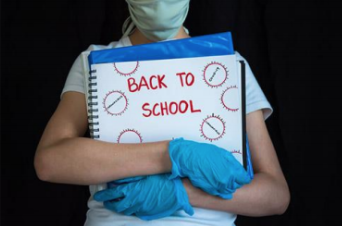A week into the start of the academic year for Asheville and Buncombe County K-12 schools, local officials remain in open, weekly conversations with district administrators to help manage the spread of COVID-19, said Fletcher Tove, Buncombe’s emergency preparedness director, at an Aug. 20 press conference.
On Aug. 18, Buncombe County Schools announced that an employee at Enka High School had tested positive for the coronavirus. Investigation of the case began as soon as county health department staffers were notified of the diagnosis, explained Stacie Saunders, Buncombe’s health director. Contact tracers worked to identify all close contacts, defined as people who had spent more than 15 minutes within 6 feet of the infected person.
Two other Enka employees were found to be close contacts and are currently in self quarantine, according to a statement from the school district. Neither had reported symptoms as of Aug. 18.
“We assess each case as it pops up and take everything into context,” Tove said. “Each one is going to have to be evaluated on an individual basis.”
Unlike K-12 public schools, colleges and universities are not required to report COVID-19 cases to local health departments. UNC Chapel Hill made national headlines this week after multiple COVID-19 clusters prompted administrators to shift all classes online just days after the semester began; clusters have also been reported at N.C. State University and East Carolina University. So far, no outbreaks have been reported at UNC Asheville, A-B Tech or any other area college, Tove added.
Health officials encourage flu shots
If one dangerous virus wasn’t enough, now is the time to start thinking about flu season, Saunders said. This year, Buncombe health officials are urging everyone to get vaccinated to reduce the impact of respiratory illnesses on the county’s population and lessen the burden on an already stressed health care system.
Getting the flu isn’t just a week in bed, Saunders warned: For young children, people over the age of 65 and those with compromised immune systems, the flu can be fatal. Saunders also recommended talking with a medical provider about other immunizations, including the pneumococcal and shingles vaccines.
Community members should plan on getting the flu vaccine by the end of October, said Dr. Jennifer Mullendore, Buncombe’s medical director. If the vaccine is administered too early, the effectiveness may wear off before flu season ends; she recommended waiting until September to receive a vaccination.
In other news
- The N.C. State Board of Elections released an updated absentee ballot request form in advance of the general election on Tuesday, Nov. 3. The deadline to request an absentee ballot is Tuesday, Oct. 27, at 5 p.m.; however, election officials encourage voters who wish to vote by mail to request a ballot as soon as possible.
- Appalachian Mountain Community Health Centers, in collaboration with Western Carolina Rescue Ministries, is offering free COVID-19 testing for uninsured individuals every Wednesday and Friday, 10:30 a.m.–2 p.m., at 225 Patton Ave. Results are typically given within five days.
- The N.C. Department of Health and Human Services is expanding the Hope4Healers hotline to include teachers, school personnel and their families. Individuals can call 919-226-2002 at any time to be matched with a licensed mental health professional.




Before you comment
The comments section is here to provide a platform for civil dialogue on the issues we face together as a local community. Xpress is committed to offering this platform for all voices, but when the tone of the discussion gets nasty or strays off topic, we believe many people choose not to participate. Xpress editors are determined to moderate comments to ensure a constructive interchange is maintained. All comments judged not to be in keeping with the spirit of civil discourse will be removed and repeat violators will be banned. See here for our terms of service. Thank you for being part of this effort to promote respectful discussion.